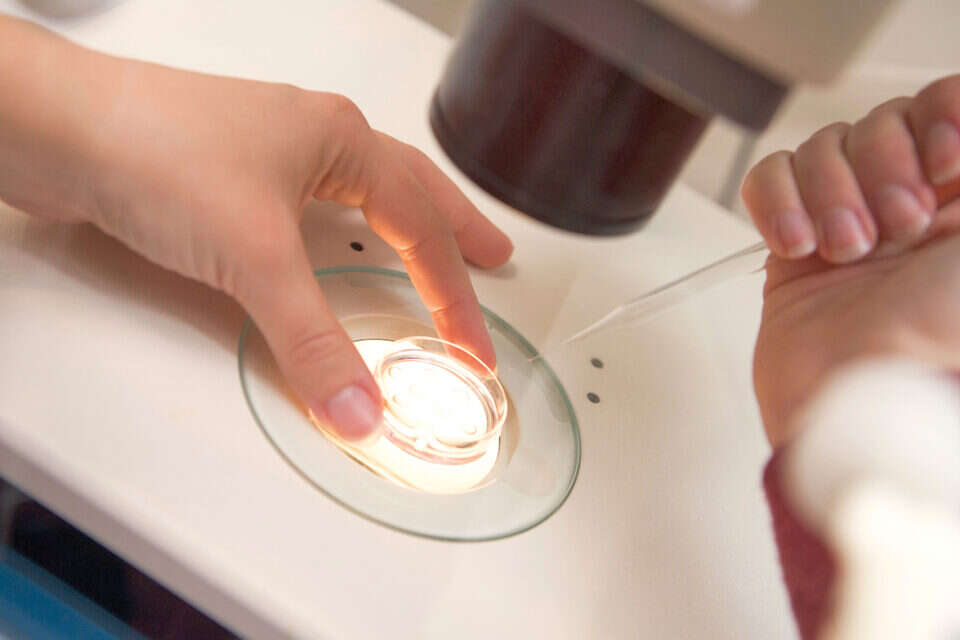The first case in Israel, and one of the few in the world: The Tel Aviv Family Court today (Sunday) allowed a young man to use the egg of his deceased partner, and to bring into the world a child by fertilizing the egg from his sperm, with the help of a surrogate. The ruling was issued after it was proven that this was the young woman's explicit wish, and after a positive report by a social worker according to the Adoption Law.
The claim to approve the use of the deceased egg was filed jointly by the young woman's spouse, as well as her parents. According to the case, the young woman and her partner, then about 31 years old, met in 2020 and tied their fate together with a deep and unique bond and true love, moved in together and even planned to marry and have children. Shortly after their acquaintance, the young woman was diagnosed with cancer, but alongside the growing love between the couple, her medical condition deteriorated. As part of the treatments for her disease, the deceased underwent an ovariectomy, during which doctors managed to extract two eggs from her uterus for fertility preservation. These eggs were frozen for future use by the deceased. While in the hospital for a bone marrow transplant, the deceased expressed her fear of death and asked her father, in the presence of the attending physician, that if she passed away, her eggs would be used to have children with her partner. The next day, the deceased also expressed this wish to her partner, who assured her that he would do everything in his power to fulfill her wish. A few weeks later, she died at the age of 28.
Tel Aviv Family Court, Photo: Joshua Yosef
Tel Aviv Family Court Judge Tzipi Cohen Avitan ruled that "there is no dispute between the parties that the deceased and the plaintiff were a couple, intended to marry and have children. Nor is it disputed that the deceased expressed her express desire that her partner use her eggs for the purpose of bringing children into the world together, even after her death. The deceased expressed her express desire to her father, to the plaintiff, and to the attending physician, who also filed an affidavit in this regard."
The deceased cried and told her father that if she died she wanted her partner to use her eggs to have children
In his affidavit, the attending physician wrote, among other things: "At the end of the biological treatment, which was successful, she had to undergo a bone marrow transplant. In preparation for the transplant, I remember arriving at her room and finding her with her father, who was by her side. She cried a lot, telling her father that she was afraid to die, and her father tried to calm her fears, telling her that it would be okay, that she would get well, get married, and have many children. The deceased cried and told her father that if she died she wanted her partner to use her eggs to have children. Her father nodded and hugged her in tears, and we both tried to calm her fears. I joined his words and told her not to worry and that we would do everything so that the treatment would succeed and she would recover." Judge Cohen Avitan ruled that "in my opinion, the doctor's affidavit is sufficient to prove not only the consent of the deceased but her clear and explicit desire for the plaintiff to use her eggs for the purpose of bringing children into the world 2."
An unprecedented determination, photo: GettyImages,
Adv. Yehudit Meisels, an expert in family and inheritance law who represented the family together with Adv. Michal Levy, said: "I welcome the ruling and am happy with its results. This is a precedent-setting and groundbreaking ruling, which continues the important trend of judicial creativity of the family courts, which adapt the law to the evolving technological reality, in order to do not only a trial, but also sensitive and humane justice. The ruling of Judge Tzipi Cohen Avitan will also pave the way for future cases in which family members wish to use an egg from the deceased, as well as in cases of a request to use sperm from the deceased. The right to parenthood has many facets to it, and the cases in which the right is exercised sometimes exceed any imagination. Much has been written in the literature and case law about the ethical, legal and humane considerations of this innovative issue, but here we have the long-awaited precedent, given after extensive and complex legal argument. As someone who has been practicing family law for many years, and although the circumstances in this case are unfortunate, I am happy about the administration of family and legal justice."
Wrong? We'll fix it! If you find a mistake in the article, please share with us

